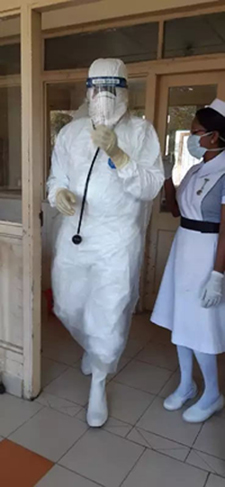News
A stitch in time that could save Lanka’s apparel industry

Wearing PPE, a doctor at the National Institute of Infectious Diseases Hospital is seen getting ready to treat Covid-19 patients
There is a glimmer of hope for Sri Lanka’s troubled apparel industry: the world just can’t have enough masks and gowns.
One producer of fashion clothing is even exploring the production of fashionable facemasks—using materials such as denim—for labels in the West, including Levis and Lucky Brand jeans. With masks becoming normalised in the foreseeable future, it makes more sense to get out of disposables and don reusable face covers that looks halfway good.
But while Sri Lankan manufacturers, like their counterparts in other countries, are edging towards personal protective equipment (PPE), industry leaders here are also cautious not to go China’s way. Earlier this month, after European buyers complained of poor standards, Chinese manufacturers were ordered to get licensed domestically before selling abroad.
“This is not a space like the conventional apparel industry,” said Sohan Patrick, General Manager of Strategic Planning and Business Support for MAS Holdings, one of the companies leading the present journey towards PPE manufacture. “We not only have to make sure we go to the right leads, there are important regulatory requirements governing standards that have to be met because these will be used in clinical settings.”
“We have made some progress although much of it is at inquiry stage,” he said. “There are some positive leads.”
The company received some initial orders for masks from an existing customer but there are many components of PPEs: gloves, gowns, shoe covers, head covers, masks, respirators, eye protection, face shields and goggles. MAS will focus on five or six of these.
Meanwhile, UNICEF and the Government this week discussed with Sri Lankan factories whether they could provide the UN agency 10 million face masks per week and a million surgical gloves for distribution worldwide.
“There is a possible business opportunity,” said Tuli Cooray, Secretary-General of the Joint Apparel Association Forum (JAAF). “But they don’t want the ordinary surgical masks that factories have so far produced for the Government using available fabric and design. They want sterile, patented, N95 masks.”
Such manufacture demands specific capacity—skills, machinery and fabric that Sri Lankan doesn’t yet have. The Board of Investment is coordinating with factories in this regard. And some large conglomerates have expressed interest, Mr Cooray said.
“Everyone is trying to understand how best to offer on price, delivery time and quality,” he explained. “We need to see if the fabric is freely available in the market before going for it. Even the Ministry of Defence wants around 60 million pieces.”
As far as certification goes, factories here will have no impediments, Mr Cooray said. They are among the best in the world. Even the smaller ones upped their standards in order to take on subcontracts. But materials and machinery have to be procured. And it is still not clear to what extent manufacturing can start in lockdown situations, even when curfew is eased.
In the next few months, traditional apparels will take a back seat, Mr Patrick predicted. Even beer companies are making hand sanitisers now. Sri Lanka’s markets in the US and Europe are nowhere close to opening up. As long as the malls are closed, usual business will be impacted. Job losses and slow economy will affect disposable income.
Many Sri Lankan factories are exploring some form of mask orders. Getting the raw material for many of the more specialised products remains a challenge.
“It’s mainly China at the moment but we also need to develop alternate supply chain partners as well as build capability to manufacture our own fast,” Mr Patrick said. “If we approach this right, not only will be gain in the short to medium term, we will hopefully build a longer term avenue.”
It has been too early to decide on the commercial viability of this segment but there “could be decent margins in PPE”.
His advice to the industry is don’t jump into it without first building competency. “Here, you are dealing with lives,” he pointed out. “The regulatory environment is also different. You can be sued.”
But, if done right, there will be enough work to go round. “Right now, there is so much of demand I don’t think one country can cater to it,” Mr Patrick said. “The requirements come in millions. And all of them needed it yesterday. Longer term, it depends on how you stabilise your performance and the trust you build with the institutions you work with.”
| Factories respond to Govt call for masks, gowns | |
| Any growth in the PPE export market will ensure that domestic requirement is also catered to, apparel industry experts feel.Many factories have already heeded the Government’s call for surgical facemasks and polythene gowns—both disposable and non-disposable. Many are part of their corporate social responsibility programmes. This week, even an auto seating manufacturer started making personal protection overalls and face shields. “We have our sewing division that does car seat covers,” said Dimantha Jayawardena, a partner of Ideal Auto Seating (Pvt) Lt. “We converted that division to do the complete, level one, disposable PPE kit and the other assembly to produce the face protection cover.” Part of this will be donated to the Government’s Medical Supplies Division. Others are available for sale. And, if the logistics can be finalised, Ideal can meet an export order it secured from Africa. |


